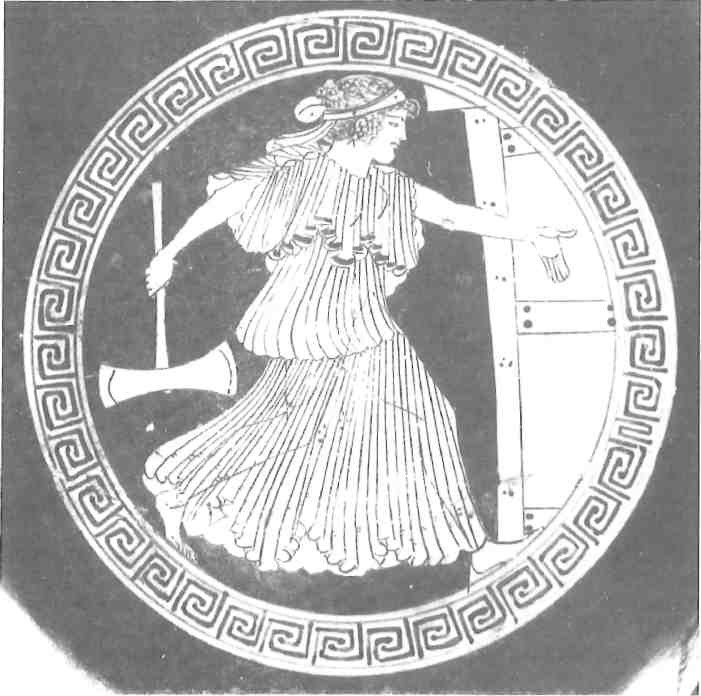May I share a secret with you? I hate Penelope, the long-suffering wife of Odysseus, that wily Greek warrior from Ithaca. He left his wife and young son to sail away with the other Achaians to fight the Trojan War. The war lasted a full ten years. When all the other Greek heroes returned home, enterprising Odysseus remained away to tour the Mediterranean, to have many great adventures, and to enjoy at least two mistresses – Circe and Calypso.
Finally, after 18 years he wandered in to find his wife just where he knew she would be. In spite of her many eligible suitors in the living room, Penelope was upstairs weaving wool silently and pondering her husband’s return. Never once did she ask the obvious question: “What kept you, dear?”

Every ancient Greek man wanted a Penelope, if he had to have a wife. Today, if you walk through the cemetery of ancient Athens you will find it full of monuments engraved to proper wives. They all read much the same, “Andromache was a good, silent maker of wool,” and, “The lady was often seen weaving wool silently.” Keeping your mouth shut was a trait praised in women by the greatest minds of the time.
Aristotle had noted, “Silence is the adornment of women.” And Socrates once asked a friend, “Is there anyone with whom you want to talk less than your wife?” Agreeing completely, his friend replied, “Absolutely not.”
Even the master of rhetoric, the original toastmaster, Demosthenes commented, ‘”One marries… to father legitimate children and to have a loyal watchdog in the house,” Well, at least he expected her to speak up in case of burglary.
The truth is that a man living in the Golden Age married at about the age of 38 or 40 to have heirs and maybe to improve his financial situation. His wife would always bring a dowry. A dowry was what the brothers and the father of the bride paid to the groom to take the girl off their hands. Medea rightfully complained, “It takes a great deal of gold to get a husband”. Except for the dowry and the hope of children, Greek men were frankly bored with their wives.
Let us tell the truth. The bride was ill-prepared for marriage, if she had been brought up properly. She had spent her childhood years in the women’s quarters of the house, never eating with the men of her family and only seeing them on rare, and extremely brief, occasions. Most of all, she had been taught to be silent and to make wool. She, in other words, had the opportunity to be a perfect Penelope. She certainly did not have the terrible vices of reading, writing, and musical training.
After having blossomed into a dull, extremely ignorant 13-year-old, a Greek girl would have her family arrange a marriage with an eligible and quasi-willing man of middle age. The couple usually met on their wedding night. The next morning the confused, and no doubt distressed, child was taken by her husband about her new house. Turning over a large ring of household keys, he explained: “This is the linen room, make sure that it is always full of clean linen. This is the armor cabinet. keep everything polished This is the servants’ quarters. Have it warm in winter and cool in summer. This is the kitchen. You’re responsible for the meals. Here is a bag of gold to run the household for a year. Make sure you stay within your budget.” Alas, this young, silent, wool-fashioning bride was programed for failure.
Because of this failure, the Greek men could hardly wait to get out of the house everyday. They would go to the law courts, go to war, go to the agora, go to the palestra to workout, and go to the house of a hetaera.
A hetaera – now that was my kind of woman. She was scandalous. She could read, she could write, she could play a musical instrument, and she was especially talented in conversing with men. The more successful of these ladies had large homes in the heart of their chosen cities filled each evening with men of renown, of wealth and of power.
Socrates could be found most evenings in the home of the in famous hetaera Aspasia, until the great Pericles decided to ignore all decency and marry her. If a man was lucky enough to receive an invitation. he would arrive at the house of the hetaera with a gift for the hostess, perhaps a lamb or a piece of jewellery. After an evening of festivities. the hetaera would, only if she wished, invite one of the men to stay. And the evidence suggests that she simply never had time to make wool.
Besides the hetaerae, there were some other Grecian gals for whom I stand in awe. In spite of everything, they fashioned their own destinies, admittedly often for the worst. But each did it her own way.
Queen Helen of Sparta, who just could not bear another day with a husband whose nickname was “Loud-With-a-War-Cry”, left for a fling with the handsome young Paris of Troy.
Then there was the naturalized Greek woman, the foreign princess Medea, who was surely a sufferer of PMS. Her husband Jason tried his best to do her wrong. He just did not realize that his wife was more than a match for anyone’s maltreatment.
But my favorite is Queen Clytemnestra, who also waited for her husband, King Agamemnon, to come back from the Trojan War. Although he returned immediately after the fighting stopped, his Majesty was headed for trouble as he drove his chariot to his citadel at Mycenae. It never entered his mind that his wife could stay angry for ten long years because he had sacrificed their daughter to gain favorable winds for his fleet to sail to Troy. He could see his queen waiting out by the Lions Gate in her eagerness to greet him. Barely noticing the beautiful young concubine he had brought back with him, Clytenmestra rolled out the purple carpet.

“Come on in Aggie” she said sweetly. “You’ve been gone to a long and dirty war. You must be weary. I’ve a lovely bubble bath ready for you, honey.”
When Agamemnon got into his warm, sudsy bath in the royal apartments, his wife threw a net over him and killed him with an axe. A sickening deed! But a woman a lot more interesting than pitiful, pining Penelope pondering in silence over her wool. I do hate Penelope.







